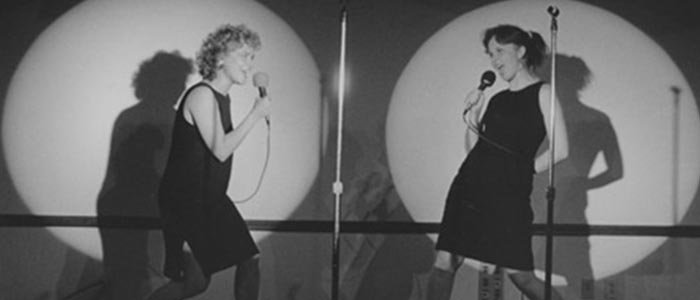
Not many people know the name Caris Corfman, but her grace and talent enamored all of those who worked with her. Caris was a working actress in film, television and theatre before she was diagnosed with a brain tumor that cost Caris her short term memory. Director Gaylen Ross made a heartwarming documentary showing return to her return to her craft when she made a one-woman show about her life. We were able to talk to Gaylen about what it was like to film with Caris and what was the most important way to tell her story.
Heartland Film Festival: When did you first meet Caris Corfman? Was it long before she started working on her one-woman show or was it the show that caught your attention?
Gaylen: I knew Caris in the 1980s when she was acting and I was directing theater at the West Bank Cafe Downstairs Theater Bar, a really cool place that was created by former Yale Drama School graduates – among them Lewis Black and Rand Foerster, and also musician/ composer Rusty Magee.
Caris was a brilliant young actress, one of the very bright talents out of Yale – she went straight to Broadway in Amadeus from school. Caris acted at the West Bank when she wasn’t involved in a larger theater venture. We knew each other well for several years and then in the early 90’s Caris started to manifest symptoms that were later understood to be a brain tumor. At the time we didn’t know that was the cause – weight gain, headaches, personality shifts – until she had a seizure in a subway and a benign tumor was diagnosed. Four surgeries later and years of recovery in rehab facilities, Caris was left without any short–term memory.
She was able to recall everything before the surgery. But it was very difficult if not impossible for her to create new memories — what she did a few hours before, or the pages of a book she had just been reading. Caris had one passion – her acting – and the desire to return to the stage and that is what compelled her to find a way to develop her one-woman show.
We had started to film years before the possibility of Caris returning to the stage was even considered, and we had no expectations that is where the film would lead, or where Caris herself would take us. But she did!
Heartland Film Festival: What were the challenges of filming with Caris? Did her condition ever make her frustrated with the process?
Gaylen: There were no real challenges to filming Caris other than we tried to divide equally ‘film’ time and just ‘friend’ time so that filming became a part of the entire process and not the objective. Caris had told Rebecca Nelson (her acting classmate at Yale, and collaborative filmmaker with me) and I that she had some things she wanted to talk about – how she experienced her memory loss, how she felt now as a person and trying to live independently with a disability. And how she felt about herself as an actress. Caris was always very articulate about her condition, unlike Alzheimer’s or dementia, she was aware of what had happened to her and indeed there were signs she was getting better. Until Caris actually started the rehearsal process, it was just myself and Rebecca with a camera. No crew, no other distractions. I wanted to make Caris as comfortable as possible with our filming, and keep the situation intimate with friends. Then later when she began work on the one-woman show, and the camera and crew appeared, we were worried that this would fluster her. But Caris was such a pro as an actress, not only didn’t it distract her, she really enjoyed having the camera there for her performances. She was a theater pro always and could handle it all even without her memory
Heartland Film Festival: Watching the rehearsal process for the show was one of the nerve-wracking portions of the movie. You really want her to succeed but you’re not sure what the final project will look like. What do you think her show accomplished?
Gaylen: We were always on the edge of our seats during the rehearsal process and especially the performance. Live theater is about that anyway – knowing that anything can happen at any time.
With Caris it took on special meaning, as not only were memorizing lines impossible for Caris, there were the concerns of where and how to move on stage, remembering notes from one rehearsal to another, and sometimes, even why she was there at all. One of the reasons that I wanted to do the film was that when audiences saw Caris’ finished performance, it was so flawless and polished, and she was so amazing as an actress, they didn’t fully appreciated how difficult and often terrifying it was for Caris to do this. What the film tries to do is to reveal the incredible efforts Caris made and her will and courage to get back on stage, and the great work her theater director Brad Watkins did in literally inventing a process for Caris to succeed. Caris through her show wanted people to understand that even with brain injury, people can accomplish what they want to do. But it is really more than that. It is about meeting great challenges with the best the human spirit can offer.
One other thing doing the play offered is healing. Caris really started to get better as she became more actively engaged in the work process, in rehearsal, in writing and performing, and being involved again in the theater community. I don’t think I can overstate the value of work and the meaning it gives to one’s life and dignity of purpose. A result of which I believe – and I leave this for the neuroscientists to figure out – is that Caris found ways to start making memories and being present in a new way in her life.
Heartland Film Festival: Seeing the importance of memory from an actor’s point of view was something I had never thought about before. Beyond just memorizing lines and cues, the memory affects the way you embody the character. This situation was especially interesting since the character that Caris was playing was herself. How do you think her condition changed the way Caris viewed herself and is that how she portrayed it onstage?”
Gaylen: First off there were tremendous physical changes that Caris endured because of the tumor and subsequent surgeries. It was originally a pituitary tumor which controls eating and Caris gained a lot of weight. And she was diabetic and was taking many medications to keep her alive. Things also slowed down for Caris because of the brain trauma. People around her had to take more time with explanations or in conversations – fast cross-talk was annoying to Caris because she couldn’t always follow the dialogue. she became more easily frustrated. She also understood that while people had her best interest at heart, she wanted to retain her independence. But that wasn’t always easy, and she had many limitations on activity and diet. The play, and especially the first-person part of it, tells her story, and it was her way of not just venting, but putting it into art. The play reflects the highs and lows of her experience, and yet is always entertaining and aware of the story-telling with beautiful language. It was important to me that the film used the play throughout so that Caris could tell her own story in her own words. This is one of the promises I made to Caris in the filming – that no one would speak for her.
Heartland Film Festival: Are you working on a next project?
Gaylen: I’m thinking of a number of documentary projects and also a feature film, all of them now I would like to do in Israel. I also have a great film on boxing that was never completed, and would love to finish that.
Heartland Film Festival: What are some of the moving films that have inspired you as a filmmaker?
Gaylen: I like films with great dramatic storytelling and that don’t tell you everything in the beginning. I like the weave of a plot and figuring out what will happen – I like it when the film is ahead of me. Quentin Tarantino said in an interview, and I agree, how much fun it used to be to walk into movie theaters when films already were halfway through. You used to be able to do this easily as one screening would run in to another, and you could just stay for as many as you liked. Doing that you had to work hard to understand what was happening because you missed the first part, and then when you saw the beginning, you would be pleased and/or surprised if you were right or wrong. My favorite films are still Godfathers 1 and 2, I also like films like The Good Shepherd and Tinker Tailor Soldier Spy, or terrific television dramas – the British version of State of Play, Prime Suspect, Luther and now Homeland to name a few.
You can buy tickets for Caris’ Peace for the following screenings:
- Mon, Oct 22, 12:30 p.m. – AMC Castleton Square 14
- Thu, Oct 25, 11:45 a.m. – AMC Castleton Square 14*
- Fri, Oct 26, 6:45 p.m. – AMC Showplace Traders Point 12*
- Two neuroscientists will be joining Director Gaylen Ross for the post-film Q&A – Professor Andrew Saykin, Director of the Center for Neuroimaging, Indiana University School of Medicine & Assistant Professor in Neurology, Gwen Sprehn, Indiana University School of Medicine
- Sat, Oct 27, 11:15 a.m. – AMC Showplace Traders Point 12
*Director Gaylen Ross will be in attendance for post-film discussion.
Interview conducted by Austin Lugar.






